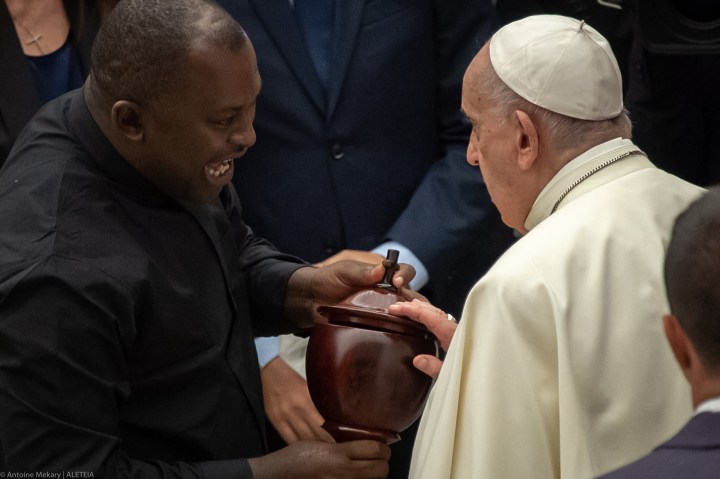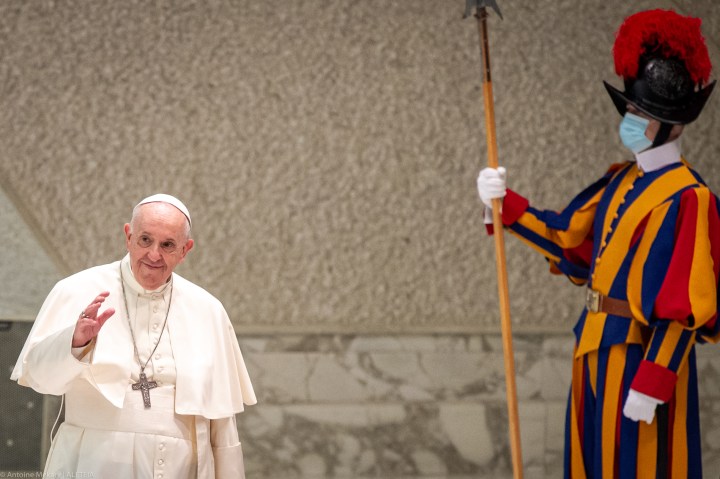Pope Francis took up a theological theme in the September 29 general audience that has been met with confusion over the centuries: the theme of justification in the writings of St. Paul.
The teaching of Scripture and Tradition has been contested from the times of Pelagius to the Protestant Reformers, and continues to be a misunderstood doctrine.
In fact, the teaching was one of the fundamental conflicts in the time of the Reformation, although recently — since 1999 — an accord has been reached. That year the Lutheran World Federation and the Roman Catholic Church published a landmark agreed text, enunciating a common understanding after 500 years. Since then, the Anglican Consultative Council, the World Methodist Council, and the World Communion of Reformed Churches have also associated themselves with the Declaration.
Someone made you just before God
Pope Francis emphasized certain point’s in today’s audience.
What is justification? We, who were sinners, have become just. Who justified us? This process of change is justification. We, before God, are just. It is true, we have our personal sins. But fundamentally, we are just. This is justification. […]
In the Letter to the Galatians, just as in the Letter to the Romans, Paul insists on the fact that justification comes through faith in Christ. “But, Father, I am just because I keep all the commandments!” Yes, but justification does not come from that. Someone justified you, someone made you just before God. “Yes, but I am a sinner!” Yes, you are justified, but a sinner. But fundamentally, you are just. Who justified you? Jesus Christ. This is justification.
Justification, said the Pope, is simply the consequence of God’s mercy.
In fact, God, through Jesus’ death – and we need to underline this: through the death of Jesus – destroyed sin and definitively granted us his pardon and salvation. Thus justified, sinners are welcomed by God and reconciled with Him. It is as though the original relationship between the Creator and the creature before the disobedience of sin intervened, has been restored.
And how, the Holy Father asked, does this justification come about?
Only through grace: We are justified because of pure grace. “But can’t I, can’t a person, go to the judge and pay so that he can justify me?” No. You cannot pay for this. Someone paid for all of us: Christ. And from Christ, who died for us, comes that grace that the Father gives to everyone: Justification comes through grace.
St. Paul, who had been a scrupulous observer of the Law, is transformed through his experience of the Risen Christ. And he discovered that “we do not become just through our own effort, no, it is not us, but it is Christ, with his grace, who makes us just.”
Paul “discovered that only God’s grace had saved him.”
So, the Pope continued, “We have been justified, we have been saved, through pure grace, not because of our own merits. And this gives us great trust. We are sinners, yes; but we live our lives with this grace of God that justifies us each time that we ask forgiveness. But not in that moment are we justified: we have been justified, but he comes to forgive us again.”
What about the Law?
Pope Francis clarified that for St. Paul, this does not mean the Mosaic Law has lost its value, since for him, it is “holy,” and an “irrevocable gift from God.”
However, even to observe the Law — an essential part of our spiritual life — we “cannot count on our efforts.”
From Him, we receive that gratuitous love that allows us, in our turn, to love in concrete ways.
But works?
The Pope pointed out the complementary teaching from the Letter of James:
In this context, it is good to recall the teaching of the Apostle James, who wrote: “You see that a man is justified by works and not by faith alone.” It seems to be the contrary, but it is not the contrary. “For as the body apart from the spirit is dead, so faith apart from works is dead” (Jas 2:24, 26). Justification, if it does not bear fruit with our works, is only that, buried, dead. It is there, but we must activate it with our works. This is how James’ words complement Paul’s teaching. For both, therefore, the response of faith demands that we be active in our love for God and in our love of neighbour. Why “active in that love?” Because that love saved all of us, it freely justified us, grace!
Our justification, said Pope Francis “incorporates us into the long history of salvation.” Despite the continual falls of humanity, God “has not given up, but he wanted to make us just and he did so through grace, through the gift of Jesus Christ, of his death and resurrection.”
Our justification is “God’s greatest nearness” to us, the Pope said, enabling us to recognize ourselves as sinners, but, to be able to say, “fundamentally, you are just.”
Allow Christ to effect that justification. We are not fundamentally condemned. Allow me to say, we are saints. But, fundamentally, we are saints: let us allow Christ’s grace to come and this justice, this justification will give us the strength to progress. Thus, the light of faith allows us to recognize how infinite God’s mercy is, his grace that works for our good.
But that same light also makes us see the responsibility that has been entrusted to us to collaborate with God in his work of salvation. The power of grace needs to be coupled with our works of mercy which we are called to live to bear witness to how tremendous is God’s love. Let us move ahead with this trust: we have all been justified, we are just in Christ. We must effect that justice with our works.


